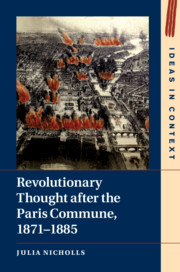Book contents
- Revolutionary Thought after the Paris Commune, 1871–1885
- Ideas in Context
- Revolutionary Thought after the Paris Commune, 1871–1885
- Copyright page
- Contents
- Acknowledgements
- Introduction
- Part I The Paris Commune and Accounting for Failure
- Part II Revolution and the Republic
- Part III Marx, Marxism, and International Socialism
- Part IV Empire and Internationalism
- Chapter 7 Deportation, Imperialism, and the Republican State
- Chapter 8 Exile and Universal Solidarity
- Conclusion
- Bibliography
- Index
- Ideas in Context
Chapter 8 - Exile and Universal Solidarity
from Part IV - Empire and Internationalism
Published online by Cambridge University Press: 12 July 2019
- Revolutionary Thought after the Paris Commune, 1871–1885
- Ideas in Context
- Revolutionary Thought after the Paris Commune, 1871–1885
- Copyright page
- Contents
- Acknowledgements
- Introduction
- Part I The Paris Commune and Accounting for Failure
- Part II Revolution and the Republic
- Part III Marx, Marxism, and International Socialism
- Part IV Empire and Internationalism
- Chapter 7 Deportation, Imperialism, and the Republican State
- Chapter 8 Exile and Universal Solidarity
- Conclusion
- Bibliography
- Index
- Ideas in Context
Summary
This chapter suggests that, rather than deportees, it was the revolutionaries who remained in Europe that produced more clearly elaborated theories on empire and international questions. It contrasts two post-Communard newspapers embodying two divergent attitudes, La Bataille and Le Travailleur. Both newspapers condemned imperial conquest in principle, but the more nationalist La Bataille approved of efforts to spread French civilisation on a global scale, while the more universalist Le Travailleur enjoined its readers to empathise with Europe’s new colonial subjects. These two approaches had radically different implications for revolutionaries’ wider thought. La Bataille’s protectionism exposed limits to its supposedly universalist thought that had not been visible in purely Western contexts, while Le Travailleur’s stance was both consistent with its universalist claims and broadened the scope for revolutionary action, highlighting practical ways in which small groups of revolutionaries could bring about meaningful social change. The chapter concludes by using the example of revolutionary thought to rethink the value of ‘empire’ as a category of historical analysis.
Keywords
- Type
- Chapter
- Information
- Revolutionary Thought after the Paris Commune, 1871–1885 , pp. 239 - 268Publisher: Cambridge University PressPrint publication year: 2019

